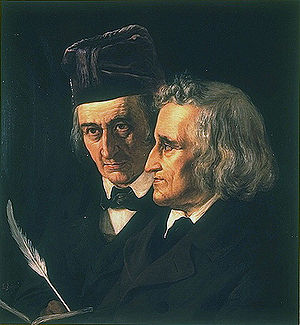From enchanting princesses asleep in faraway castles to mischievous creatures causing mayhem, the fairy tales penned by the Grimms’ Brothers have cast a spell over generations. Their cultural legacy is undeniably significant, making them synonymous with the very essence of storytelling. If you’ve ever been curious about the timeless magic encapsulated within the pages of Grimms’ tales, this article promises a captivating journey into their world.
Origins of Grimms’ Fairy Tales
Jacob and Wilhelm Grimm, more popularly known as the Grimms’ Brothers, were born in late 18th-century Germany. Driven by a desire to preserve German folklore and culture amidst the political upheaval and urbanization of their time, they embarked on a mission to collect and curate tales from the country’s many regions. Their collection, “Children’s and Household Tales”, first published in 1812, was an amalgamation of stories passed down orally, many told by women.
Quick Fact: Despite the popular belief, the Grimms’ Brothers did not “write” these tales. Rather, they collected, edited, and published them.
The Global Phenomenon of Grimms’ Tales
It’s hard to browse a bookstore, flip through TV channels, or even search for apps without coming across the influences of Grimms’ fairy tales. Stories like “Cinderella”, “Snow White”, “Little Red Riding Hood”, and “Hansel and Gretel” have been retold, reimagined, and reinterpreted countless times across various cultures and mediums.
The universal themes of love, bravery, deceit, and triumph over adversity resonate deeply with audiences, making these tales not just entertaining but also impactful. Their versatility in adaptation — from animated films to theater and modern literature — testifies to their enduring allure.
The Darker Side of Grimms’ Tales
Modern interpretations of Grimms’ tales often favor sanitized and child-friendly versions. Yet, those who delve into the original stories will find them steeped in darkness, offering lessons and morals that could be quite grim. Themes like revenge, sacrifice, and the often harsh realities of life are interwoven in these tales, making them as much for adults as they were for children.
For instance, the original “Cinderella” featured more macabre elements, like the stepsisters cutting off parts of their feet to fit into the glass slipper. Such themes serve as a reflection of the societal conditions and beliefs of the time, offering valuable historical and cultural insights.
The Cultural Legacy of Grimms’ Fairy Tales
Beyond entertainment, the Grimms’ tales have profound significance in preserving Germanic folklore and, by extension, European culture. They introduce readers to the moral fabric, historical context, and imaginative capacity of an era long past. Moreover, by immortalizing regional tales, they also highlight the rich tapestry of stories that exist within a culture, emphasizing unity in diversity.
Universities and scholars continue to study Grimms’ tales for their linguistic, cultural, and socio-historical values. They’re not just stories, but a gateway to understanding a civilization and its evolution.
The Grimms’ Brothers Fairy Tales are more than mere bedtime stories. They are a testament to the power of storytelling, an embodiment of cultural values, and an evergreen source of inspiration. Whether you are rediscovering them as an adult, sharing them with a new generation, or delving into their deeper meanings, there’s a wealth of magic waiting to be unraveled.
As we close the book on this exploration, it’s evident that the allure of Grimms’ tales isn’t just in their enchanting narratives, but in the timeless lessons they offer. Dive into their world, and you’ll find yourself immersed in a rich tapestry of history, culture, and imagination.
Related articles:
German Fairy Tales: How Brothers Grimm Shaped World Literature
Hidden Messages in German Fairytales
German Literature: From the Brothers Grimm to Contemporary Authors
In the Shadows of Enchanted Woods: A Journey Through The Grimms’ Brothers Fairy Tales
E.T.A. Hoffman
Bertolt Brecht
Friedrich von Schiller – the German Genius of Beauty and Freedom
Johann Wolfgang von Goethe
Heinrich Theodor Böll


